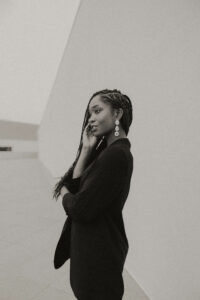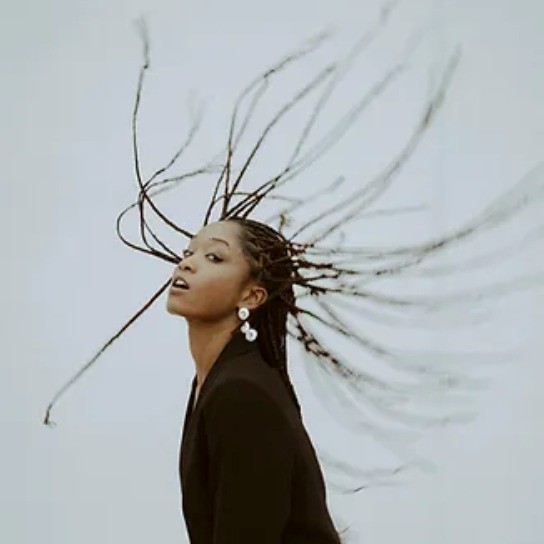EYE ON THE PRIZE: Winner of the Washington Master Chorale’s Inaugural Florence Price Commission Competition, Mason Bynes will have her work “Dust Bowl” premiered by the Washington Master Chorale on Sunday, Oct. 22-5 PM at the Church of the Epiphany in Washington, D.C.
Q and A: I caught up with the composer recently about her upcoming engagement in DC and her flourishing career as a composer and multi-faceted musician.
Patrick D. McCoy: What are some of the first things that you consider when you are composing a commissioned piece?
Mason Bynes: I usually start with thinking of the story and theme first. Sometimes it is the text that inspires the story, and other times I think it comes from within or from the world around me. It’s interesting,
lately I’ve noticed that I spend a significant amount of time on this portion of the composing process, but I think it’s because I enjoy the imagination stage so much. Imagination is the catalyst for me, and it helps me to have some sort of emotional intelligence that informs the artistic process. Then I will move on to addressing instrumentation, and I will begin to source repertoire that fits the instruments that I am writing for so that I can establish a “sound world” that I can live in and be inspired by before writing. These first few stages of composing help me to communicate the goal of the piece.

(PHOTO CREDIT: Matao Aric)
PDM: I understand that you are a singer. When did you discover your niche as a composer and how does that inform your background as a singer inform your vocal compositions in particular?
MB: I grew up singing gospel music in church back home in Houston, and that had such an effect on my perception of harmony and their vibrations. My parents put me in piano lessons when I was young, and my rebellious spirit wanted to learn how to play the music by ear instead of reading the sheet music, so that was an indicator! Then when I was in high school, I was the biggest choir nerd, and my friends and I used to sing together in a group when our varsity choir sold singing valentines for students and faculty/staff. This was what sparked my composing because I brought my singer-songwriter style to composing, and I would arrange songs and teach them to my friends by route (huge thank you to our director, Mrs. Matysiak- you got me started!). I also accompanied us on guitar so it was the perfect vehicle to test out my writing skills. I love to sing, so when I was embarking on my musical journey I used singing as a networking tool. Gigging with other singers in jazz concerts, opera productions, and choral festivals established trust with other singers who were looking for new music. I use singing sometimes in the composing process too, even if I’m not writing for voices. If I have an idea, I will whip out Garageband on my phone and layer my own vocal lines and extract the audio so that I can carry that idea with me in my headphones wherever I’m going.
PDM: As a Black composer, who are some of the pivotal figures that have inspired your own work as a composer?
MB: I’ve sung a lot of Moses Hogan while being steeped in the choral gig scene up in Denton and Dallas during my college years, and his approach to harmony in his choral works has always been inspiring to me. Margaret Bonds too…need I say more? Currently, Valerie Coleman’s music has helped my string writing. I remember watching Sphinx’s performance of her work “Tracing Visions” at Carnegie Hall on YouTube a while back. The electricity and energy that surges towards the ending was so exciting to me, and I instantly thought “wow, how can I have an effect like that in my music?”
PDM: If you had just a second to offer a word of advice to an aspiring composer, what would that be?
MB: Remember that curiosity is the agent for inspiration. I think it is important to stay curious not only about your music and inspirations but also about yourself and the world around you. Music can bring us to all corners of the world, and it is a blessing to have a vehicle that brings so much life to yourself and to others. Lastly, try everything and anything and fail fast, ha! It’s the best way to learn and build your artistic process. You are only responsible for your effort.
PDM: What is something about your career path that you would have done differently, given the opportunity?
MB: I’m not sure that there is a singular event that I would have done differently, as I’m grateful for the lessons learned through the challenges and trials that can come with composing. However, I would tell my younger self to rest more after completing a commission. Composing is a form of fixation in my opinion, and the release and relief that I feel when reaching a double bar line feels like approaching the finish line of a marathon. To continue in this metaphor, I would tell myself to “rest with your friends and colleagues who waited for you at the finish line. Relax and receive that love and new perspective in life that comes after achieving what started in your imagination.”
The Washington Master Chorale led by artistic director Thomas Colohan will begin its season Sunday, October 22 with the concert “I, Too, Sing America” at Church of the Epiphany (1317 G Street, NW). The concert will feature the world premiere of Mason Bynes “Dust Bowl.” This concert will celebrate the contributions by contemporary Black American composers to the choral music canon, including works by renowned Washington DC composers Ronald Walton, Marcea McGuire, and Adolphus Hailstork, among others.
PLANNING TO GO:
Sunday, October 22, 2023 | 5:00pm
Church of the Epiphany
1317 G Street, NW
Washington, DC
A native of Petersburg, VA, Patrick holds a BM in Vocal Performance from Virginia State University and a MM in Church Music from Shenandoah Conservatory. Formerly the Performing Arts Columnist for Washington Life Magazine, he currently is a freelance writer, publishing articles for several noted publications and organizations, including The Washington Post, Early Music America, Classical Music Voice North America, The Afro-American Newspaper, Prince George’s Suite Magazine, CBS Washington, Examiner.com and Washington Classical Review. He holds membership in the Music Critics Association of North America, National Association of Negro Musicians, Inc., American Choral Directors’ Association, Association of Anglican Musicians, a former member of the Shenandoah University Alumni Board of Directors, a member of the Shenandoah University Black Alumni Network, a Life Member of Alpha Phi Alpha Fraternity, Inc. and a member of the Sigma Zeta Chapter of Phi Mu Alpha Sinfonia Fraternity of America. As an alumnus of Shenandoah, he was named to the Dean’s Circle of the Shenandoah Conservatory Advisory Board. He enters his 7th year as Organist/Choirmaster at Saint John’s Episcopal Church, Zion Parish in Beltsville, MD and is the newly hired Development and Communications Manager for Washington Conservatory of Music in Glen Echo, MD. Visit http://patrickdmccoy.com and follow him on twitter @PatrickDMcCoy, IG: PDM06. and subscribe to “Across the Arts” on YouTube.


